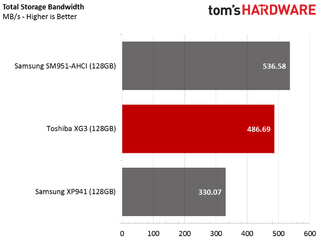Toshiba XG3 M.2 PCIe SSD Review: An OCZ RevoDrive 400 Primer
Toshiba started shipping the XG3 last year, but the SSD remained an OEM secret until now. The XG3 is coming to the retail market as OCZ's RevoDrive 400 in 2016. Today, we look at an OEM XG3 to get a feel for the device's performance.
Why you can trust Tom's Hardware
Real-World Software Performance
PCMark 8 Real-World Software Performance
For details on our real-world software performance testing, please click here.










All three drives deliver nearly identical single-application performance. This is common when we separate SATA and PCIe storage products.
Total Storage Bandwidth

The combined results, shown in throughput, demonstrate a wider gap between the three SSDs. Toshiba's XG3 trails the SM951-AHCI in many of the timed tests, which is reflected in the throughput results. The same drive in OEM form isn't far enough behind to be considered slow. Its performance is still quite a bit better than any SATA 6Gb/s competitor.
PCMark 8 Advanced Workload Performance
To learn how we test advanced workload performance, please click here.



Moving over to heavier workloads, where internal garbage collection and other wear-leveling schemes come into play, the XG3 fares well. This is basically what you'd see in write-heavy workloads and when the SSD is nearly full of data.
Access Time Test



The access times for all three low-capacity M.2 drives are greater than what we see from higher-capacity PCIe-based models. It's possible to get better latency with premium SATA SSDs like Samsung's 850 Pro and SanDisk's Extreme Pro. This is really the challenge facing low-capacity PCIe drives claiming premium performance. Nobody wants to pay big money for 128GB.
Latency is arguably more important than throughput on the desktop. You feel a drive's latency; it's what makes you think a computer is fast. There are only a few SATA SSDs that deliver lower latency than the XG3. But given today's pricing, you can find SSDs with twice as much capacity for the same amount of money.
Current page: Real-World Software Performance
Prev Page Performance Test Results Next Page ConclusionStay on the Cutting Edge
Join the experts who read Tom's Hardware for the inside track on enthusiast PC tech news — and have for over 25 years. We'll send breaking news and in-depth reviews of CPUs, GPUs, AI, maker hardware and more straight to your inbox.
-
toddybody Can't wait till these faster M.2 drives are priced where SATA-SSDs are currently.Reply
I'd love to use M.2 SSDs (250GB-1TB @ ~1400MB/s) for boot/primary drives, and low cost SATA (1-3TB @ ~550MB/s). HDDs can still find value as back up devices with soaring storage sizes for their price. -
Mitchell Marvin Over Christmas i built a new PC around a 6700k and a 980ti but reused a 5 year old 128gb Mushkin SSD, I'm waiting for the right M.2 SSD to catch my eye, and trying not to buy the Samsung one just because its the only one out at the moment.Reply -
Eggz Good information, but the comparison to the XP941 and SM951 seems a little misplaced. Neither of those drives are NVMe SSDs, but this Toshiba-based OCZ drive is. Why not compare with the Samsung 950 Pro instead?Reply -
ssdpro ReplyWhy not compare with the Samsung 950 Pro instead?
You can't make that comparison. The Samsung 950 Pro performance needs to be shown in very specific ways. If you test the 950 Pro using the same methods the 950 Pro would throttle and expose some pretty horrid performance.
-
CRamseyer That is not accurate ssdpro.Reply
I wanted to stay with 128GB capacity class products. The performance increase from 128GB to 256GB is fairly large. I have a 128GB SM951-NVMe on the way but it is not here yet. Samsung didn't release the 950 Pro in this capacity size. -
rantoc ReplyWhy not compare with the Samsung 950 Pro instead?
You can't make that comparison. The Samsung 950 Pro performance needs to be shown in very specific ways. If you test the 950 Pro using the same methods the 950 Pro would throttle and expose some pretty horrid performance.
Agree, got an 950 and just to be sure i placed a heat-sink on its processor and aligned the chassis airflow a little so now it even benchmark consistently. Under normal desktop usage i doubt anyone will ever see the throttling thoo -
Eggz Reply17553728 said:Why not compare with the Samsung 950 Pro instead?
You can't make that comparison. The Samsung 950 Pro performance needs to be shown in very specific ways. If you test the 950 Pro using the same methods the 950 Pro would throttle and expose some pretty horrid performance.
"It gets too warm" isn't a reason to compare dislike hardware. NVMe drives on PCIe should be tested against other NVMe drives on PCIe. A 950 Pro with a heat sync makes for a better comparison than an AHCI drive without one. Don't get me wrong, I think the drives tested would augment the comparative data in a useful way, but it's incomplete without an apples-to-apples comparison. Better to compare hot apples to warm apples than it is to compare cool oranges to warm apples - or you avoid the issue and cool the hot apples until they're warm.
